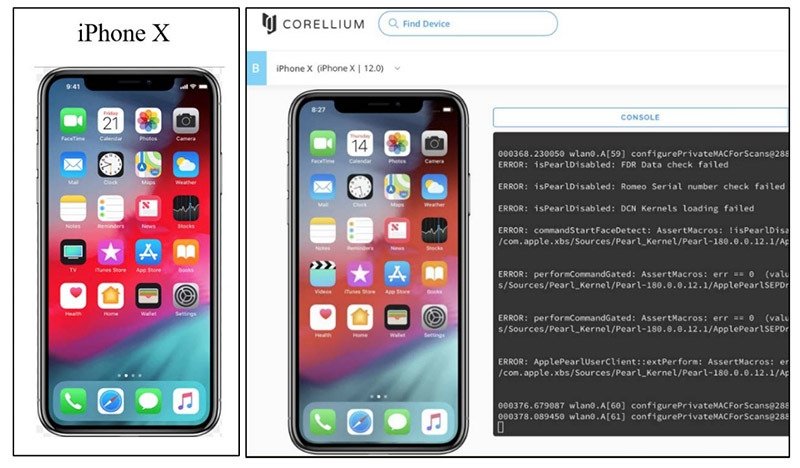Apple to pursue copyright claims against Corellium in appellate court
Apple on Tuesday filed a notice of appeal in its copyright infringement lawsuit against Corellium, a case that was partially settled last week.

Filed with the U.S. District Court for the Southern District of Florida, the notice appeals to the Court of Appeals for the Eleventh Circuit a final judgment entered into the docket earlier today regarding Apple's claims of copyright infringement.
Specifically, the appeal targets a summary judgment (now part of the final judgment) reached in December 2020. At the time, U.S. District Court Judge Rodney Smith ruled in favor of Corellium and against Apple on the tech giant's claims of direct infringement.
"Weighing all the necessary factors, the Court finds that Corellium has met its burden of establishing fair use. Thus, its use of iOS in connection with the Corellium Product is permissible," Judge Smith wrote in December.
Apple is able to appeal the ruling only as it relates to injunctive relief, leaving the door open for a ruling that would force Corellium to shut down its iOS and iTunes virtualization product.
A Digital Millennium Copyright Act claim carried forward and was scheduled to go to trial on Aug. 16, but both parties agreed to settle that portion of the case last week.
Apple's notice of appeal was first reported by Reuters.
Apple's lawsuit was originally filed in 2019 when the iPhone maker claimed Corellium's emulation products infringe on copyrights covering iOS, iTunes and other technologies. Corellium markets a set of virtualized versions of Apple's iPhone and other products to developers and security researchers, customers who license access to search for bugs, flaws and vulnerabilities.
Last week, Corellium COO Matt Tait took to Twitter to defend Apple's recently announced child sexual abuse material protections, arguing that potential expansion of the system through database modification -- a major concern for privacy advocates -- is an unlikely risk.
On Monday, the software company announced a new "Open Security Initiative" designed to help validate vendor security and privacy claims. The project aims in part to assist developers in the verification of Apple's CSAM system.
Read on AppleInsider

Filed with the U.S. District Court for the Southern District of Florida, the notice appeals to the Court of Appeals for the Eleventh Circuit a final judgment entered into the docket earlier today regarding Apple's claims of copyright infringement.
Specifically, the appeal targets a summary judgment (now part of the final judgment) reached in December 2020. At the time, U.S. District Court Judge Rodney Smith ruled in favor of Corellium and against Apple on the tech giant's claims of direct infringement.
"Weighing all the necessary factors, the Court finds that Corellium has met its burden of establishing fair use. Thus, its use of iOS in connection with the Corellium Product is permissible," Judge Smith wrote in December.
Apple is able to appeal the ruling only as it relates to injunctive relief, leaving the door open for a ruling that would force Corellium to shut down its iOS and iTunes virtualization product.
A Digital Millennium Copyright Act claim carried forward and was scheduled to go to trial on Aug. 16, but both parties agreed to settle that portion of the case last week.
Apple's notice of appeal was first reported by Reuters.
Apple's lawsuit was originally filed in 2019 when the iPhone maker claimed Corellium's emulation products infringe on copyrights covering iOS, iTunes and other technologies. Corellium markets a set of virtualized versions of Apple's iPhone and other products to developers and security researchers, customers who license access to search for bugs, flaws and vulnerabilities.
Last week, Corellium COO Matt Tait took to Twitter to defend Apple's recently announced child sexual abuse material protections, arguing that potential expansion of the system through database modification -- a major concern for privacy advocates -- is an unlikely risk.
On Monday, the software company announced a new "Open Security Initiative" designed to help validate vendor security and privacy claims. The project aims in part to assist developers in the verification of Apple's CSAM system.
Read on AppleInsider

Comments
Apple is the one who has made it possible for third parties to do this research and perform audits on their CSAM system, not Corellium.
Apple appealing this case does nothing to hamper the countless other researchers who will no doubt also be looking into how CSAM scanning works.
The most reasonable explanation is there’s a time limit on the appeal or some other procedural
matter that happened to coincide with this announcement. Or, more likely, Corelliums lawyers knew there was a deadline and made their announcement to coincide with it to try and make Apple look petty.
But hey, you do you.
Sounds crazy to me… care to defend your assertion?
But even if there was such doubt, Apple indicated a couple of days ago in a different fling (i.e. its joint filing with Corellium stipulating to the dismissal of certain claims) that it was going to appeal the copyright claims decision. That filing asked the court to enter a final judgment so that Apple could file its notice of appeal.
https://www.washingtonpost.com/technology/2021/08/10/apple-drops-corellium-lawsuit/
It wasn't until late yesterday that the other filings were published and became more widely known today. The picture is clearer now.
I would add that, I've found that reporting on legal issues and legal processes is generally pretty poor. There are some legal blogs that do a good job. But reporting from most sites that aren't dedicated to legal issues just isn't very good. It often seems not to understand the crux of the legal issues, or gets important details wrong, or mischaracterizes reasoning or decisions or the implications thereof. That's not a criticism of particular sites, but of legal reporting in general. And often such reporting is largely restatement of what other sites - e.g., Reuters or AP - have reported, where those other sites got stuff wrong, left out important details, or lacked fundamental insight.